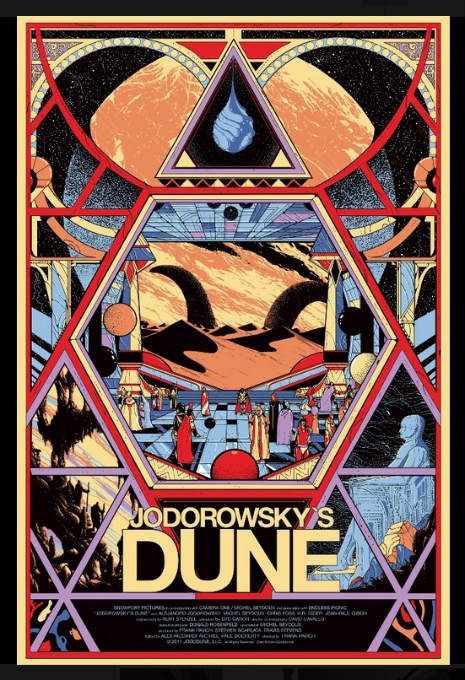
Poster art: Kilian Eng.
Of the dozen or so films I’ve seen so far at this year’s Fantastic Fest in Austin there are two that actually enter the realm of unrestrained awesomeness that I associate with the word “fantastic.” Frank Pavich’s Jodorowsky’s Dune and Alfonso Cuarón’s Gravity are head trips that leave one in a state of elation and hope. Both are pure cinema, head trips that take you to places you knew might exist but never thought you’d actually encounter.
Even though Jodorowsky’s Dune is a documentary it weaves a story as compelling and dramatic as any narrative film. And it is imbued with the magic of its subject: the fiery and brilliant Alejandro Jodorowsky.
Jodorowky’s El Topo was a life-changing film for many of us who saw it when it was released in 1970 and it continues to inspire awe in generations of audiences since. I have spent over four decades turning people onto the movie, either through rare underground screenings, bad bootlegs or the lovely remastered digital versions released in the past ten years. Giving someone a Blu-ray of El Topo is the electronic equivalent of placing a hit of Owsley on their tongue. Jodorowsky is all about changing your mind…in big and profound ways.
It was Jodorowsky’s dream to make a movie version Frank Herbert’s Dune that would give you the acid experience without the drug. Until now, I could only imagine what a trip that might have been. But thanks to Pavich’s wonderfully insightful and skillfully executed film, the Jodorowskian mindfuck has been unleashed like a tsunami of particularly psychotropically potent melange.
Jodorowsky’s Dune chronicles the herculean efforts of Jodorowsky and a crew of extraordinary collaborators as they attempt to create a film version or riff on Frank Herbert’s classic science fiction novel. It’s a story that is both heartbreaking and exhilarating. You feel Jodorowsky’s pain in not being able to bring to fruition “the greatest film never made” while at the same feeling the buzz of the passion fueling Jodorowsky’s vision. In addition, by deftly animating Jodorowsky’s storyboards, director Pavich gives a glimpse into what might have been. These scenes may be the closest we’ll ever get to acutally seeing Jodorowsky’s sci-fi epic.
For me, Dune will be the coming of a god. I wanted to make something sacred, free, with new perspective. Open the mind!”
The journey of Dune involves a collection of “spiritual warriors” who, despite not arriving at the end of their destination, ultimately managed to alter cinema forever. H.R. Giger, Moebius, Dan O’Bannon, Michel Seydoux, Chris Foss and countless others infiltrated pop culture through a trajectory mapped out in the alchemical forces generated by one of the great magicians, Alejandro Jodorowsky.
While it may never have been embedded in silver nitrate, in many ways Jodorowsky’s Dune has had a life that transcends celluloid. It moves through the ethers waving an invisible wand over the theater of our minds. Its influence is incalculable. Pavich’s film makes a case that virtually every science fiction made since the mid-seventies has borrowed or stolen ideas, design and visual concepts from Jodorowsky’s plans for Dune.
Jodorowsky’s Dune won the Audience Award at Fantastic Fest and Best Documentary. It will be released in early 2014.
I had an opportunity to meet director Frank Pavich and we talked about his film. What was intended to be a conventional interview became a lively rap session in which we both sang the praises of our hero. I normally don’t inject myself into an interview to the degree I do here, but I couldn’t help myself. Frank and I are kindred spirits and we were both on a Jodo roll.